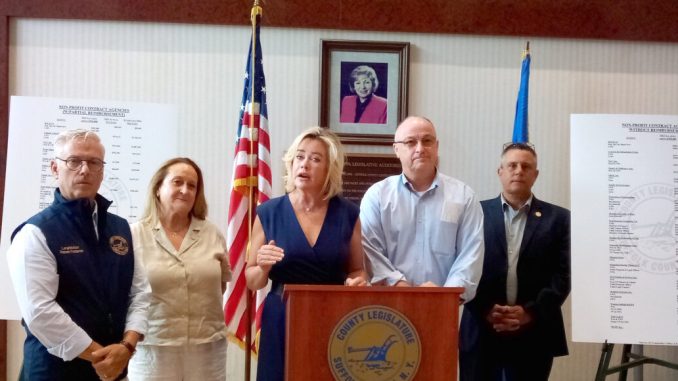
Previously Published in The Messenger
The latest legislation introduced by Legislators Trish Bergin (R-East Islip) and Rob Trotta (R-Fort Salonga) poses an important question that is likely to be mired by inaccurate headlines and the quasi-justified public outrage those headlines are likely to incite.
In short, Bergin and Trotta, with support of several other legislators, have proposed an amendment to the Suffolk County Code, which would effectively cap County subsidies to non-profit agencies whose employees make more money than Governor Hochul (D). Her salary is a hefty $250,000 per year.
And it makes sense. Why should the executive of a non-profit whose mission is to feed the homeless make more than the Governor? If it’s a massive, statewide organization that employs tens of thousands of people, then perhaps it’s deserved.
But more often than, within county lines at least, that doesn’t seem to be the case. And we’re eagerly awaiting headlines that insinuate Bergin, Trotta, and company “don’t support non-profits”, or that they “want to take money away from charitable organizations,” or that they “want to dictate how much money you should be able to make.”
We’ve read the legislation and we find its language to be sound and its purpose to be reasonable. We’re not in the business of telling people how much money they deserve to make, but when you commit your mission to helping others, something else should certainly come first.
Trotta put it perfectly in our interview with him by saying that these organizations do not employ massive amounts of people, nor are most of them performing “brain surgery.” If a non-profit wants County funding, a requirement to show tax returns proving company expenditures shouldn’t be met with protest.
To cut waste, fraud, and abuse, more County money should go to non-profits who can demonstrate that the lion’s share of their funding goes to their recipients. More County money can go to other organizations, while those who rake in six-figure salaries should possibly reconsider their accounting.
We support the idea of this legislation and commend Trotta and Bergin for openly voicing their invitation for suggestions of exemptions and parameters. Trotta heavily emphasized that there will be exceptions on an ad hoc basis, as the primary objective shared by the legislators introducing the resolution is to put more money into the communities of need, rather into an executive’s pocket.
We also predict the onslaught of headlines and editorials negatively painting Trotta and Bergin as despots who seek to rip funds from charitable organizations. To get ahead of the curve, we could not disagree more with such potential characterizations and we encourage anyone concerned about the aspects of the bill to read it themselves or voice their concerns at a meeting of the Suffolk County Legislature.

